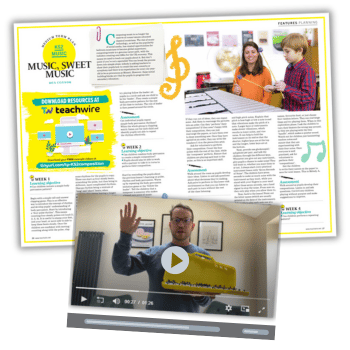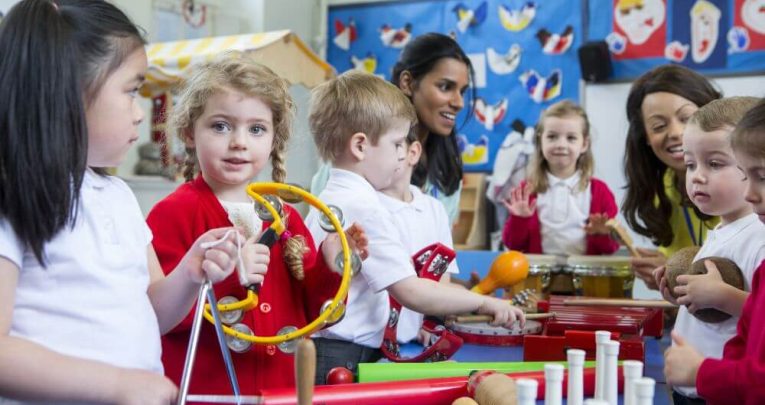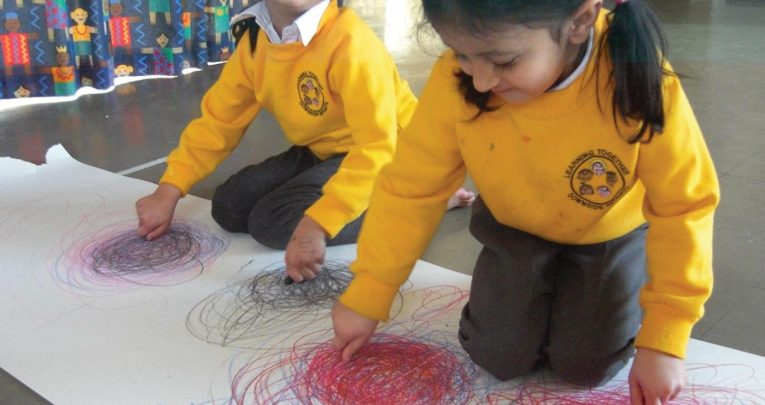You Don’t Have To Be A Specialist To Make Music With Your Primary Class

Musical expertise may be in short supply among teachers, so wouldn’t it be better to leave music teaching to the specialists? Anna Gower is not convinced…
- by Anna Gower
- Head of primary music at St Andrews International School, Bangkok Visit website

“I’m really sorry, I’m not sure I should be here. I can’t play anything. I just sing Frozen songs with my kids in the car. I’m really not the right person to do this.”
Fiona is the headteacher of a primary school, and she has come to a taster session to find out if she’d like her school to get involved in a pilot project called Just Play, which is about whole-class music making at KS1 – designed to be delivered by any teacher that wants to make music with his or her class, regardless of musical experience. Fiona isn’t the first person to come into the room, look at the guitars and keyboards all set up ready to play and panic. In fact, the faces in front of me often show a mixture of fear, skepticism and in some cases even tears. Yet as we play together, support each other and experience music from the perspective of learners, I begin to see some incredible progress being made. Not just in actual musical skills, nor the perception that you need to be a specialist in order to teach music – but also in what music means to each of the teachers, and how they would like their pupils to be able to have these experiences too.
What is a ‘specialist?’
With restrictions on the time devoted to specific music training for primary teachers, and many members of the profession having had few music experiences in school themselves, it’s no wonder that “I can’t teach music” has become a deep-seated belief. But what actually constitutes a music ‘specialist’? Is it having some instrumental skills, a music degree, performance career or specialist subject training? Are these sufficient to ensure that what pupils experience in those precious few hours of music – often squeezed into a hugely tight curriculum with so many conflicting priorities – will be enough? Or is there another way to make music accessible and sustainable in our primary schools by breaking down the specialist / non specialist barrier? Those involved in the pilot project who were about to embark on teaching music with their classes described the characteristics of a Just Play teacher as:
• Confident • Willing to have a go • Knowing when to take take a step back • Not afraid to repeat things • Able to make it relevant • Willing to let go of the traditional teacher / pupil relationship
Essentially, a list of characteristics you could apply to a good teacher of anything!
Leading by instinct
Watching Just Play in action in classrooms, I have had to throw aside many of my own preconceptions. Looking past things that, as a specialist, I would find easy to identify and correct – such as some wrong notes or slips in timing – I have had to accept that the benefits of whole-class music making don’t necessarily lie in just playing the right notes at the right time.
There’s another level of broad, transferable learning happening, and it’s happening in music lessons being led by specialists and non specialists alike. I’ve seen counting skills, listening skills, collaboration, focus, coordination, increased memory and improved wellbeing, among many other benefits – none of them expressly musical. In addition, I have seen teachers leading musical activities instinctively, moving with the music, modelling, working with the children to shape sound into their own creations, and building on the strength of that teacher / pupil relationship that underpins so much in primary teaching. I have witnessed children jump ahead of the teacher, differentiating themselves and allowing space for the teacher to help those who need it. Perhaps coming to music teaching without some of the preconceptions of what it should be like allows us to explore what it could be like for the children in our schools. Now there’s an exciting thought.
Anna Gower has recently embarked on a new full-time role as head of programmes for Musical Futures, having previously worked in secondary schools as a classroom music teacher, AST head of music, and freelance music education consultant
For more information, visit www.musicalfutures.org or follow @tallgirlwgc










